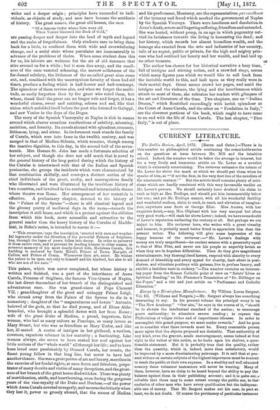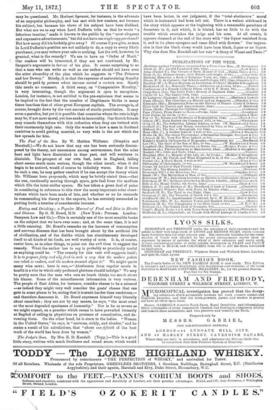Essays by a Birmingham Manufacturer. By William Lucas Sargent. Vol.
III. (Williams and Norgate.)—Mr. Sargent always has something interesting to say. In his present volume the principal essay is on "The New Academy." "Our aim," he says in the course of it, "should be to elevate the intellectual standard of the nation ; to eneourage grave authorship ; to stimulate severe reading ; to repress the Philistinism of vulgar riches and of impertinent idleness. In order to accomplish this grand purpose, we must confer rewards." And he goes on to consider what these rewards must be. Every reasonable person must agree that the objects proposed are desirable. That authorship of any kind, even the gravest, needs encouragement, seems indeed at first sight to the writer of this notice, as he looks upon his shelves, a ques- tionable statement. But it is probably true that the quality, rather
than the quantity, which is, indeed, more than satisfactory, would be improved by a more discriminating patronage. It is said that at pre-
sent writers on certain subjects of the highest importance must be content to teach the public at their own expense. In a wealthy and Well educated country these volunteer instructors will never be wanting. Many of them, however, have no claim to be heard beyond the ability to pay the balance against them in their publishing account ; and it is quite cor.-. ceivable that these may to some extent occupy the public ear, to the-, exclusion of other men who have every qualification but the indispens- able one of money. That Mr. Sargent makes out his case, in part at least, we do not doubt. Of course the pertinency of particular instances
may be questioned. Mr. Herbert Spenoer, for instance, is the advocate of an unpopular philosophy, and has met with few readers, not because Ins subject, but because his views of his subject have been disliked. But what are we to say when Lord Dafferin tells us that he wrote "a laborious treatise," made it known to the public by the "moat eloquent and expressive advertisements," but did not have one single copy purchased? But how many did his lordship give away ? Of course if you give, as men in Lord Dufferin's position are not unlikely to do, a copy to every likely purchaser, you may reduce your sale to nothing. Let the evil, however, be granted, what is the remedy? We are to have an "Order of Merit." Our readers will be interested, if they are not convinced, by Mr. Sargant's arguments in favour of his plan. It seems surprising to us that a man who can write so well as our author should not have seen the utter absurdity of the plan which he suggests in "The- Princess and her Dowry." Briefly, it is that the expenses of maintaining Royalty should be paid by persons whose incomes exceed a certain sum. Surely this needs no comment. A third essay, on "Comparative Morality," is very interesting, though the argument is open to exceptions. London, for instance, is not entitled to the pre-eminence that seems to be implied in the fact that the number of illegitimate births is many times less than that of other great European capitals. The average is, of course, brought down by the vast amount of sterile prostitution. It may seem a paradox, but yet it is possible that countries where the rate is high may be, if not more moral, yet less sunk in immorality. Our Scotch friends may console themselves with this reflection when they are twitted with their enormously high rate. Only the wonder is how a man in Scotland contrives to avoid getting married, so very wide is the net which the law spreads for him.



































 Previous page
Previous page